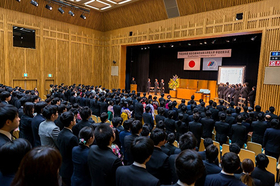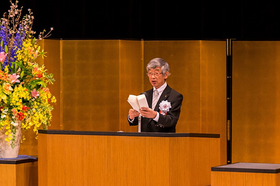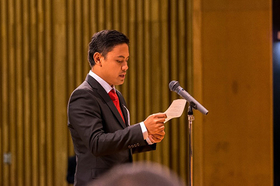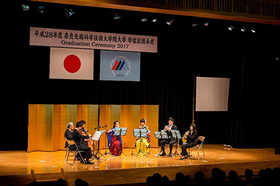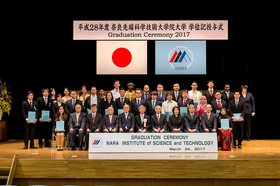2017/03/29
On Friday, March 24, 2017, a graduation ceremony was held in the Millennium Hall and 396 students received diplomas.
At the ceremony, President Ogasawara handed over diplomas to the students and gave them a congratulatory speech, followed by the speech of Mr. Shigekazu Nakamura, the Executive Director of the Foundation for Nara Institute of Science and Technology.
Then Best Student Awards were conferred to 12 winners by the Foundation.
In addition, the chamber music ensemble which has become an annual event was performed by students and the staff volunteers.
At the party held after the ceremony, graduates enjoyed themselves together with President, Executive Directors and their supervising professors in a friendly atmosphere.
*Number of Graduates in March
【Master's Graduates】
Information Science 122 (11 International students)
Biological Sciences 114 (3 International students)
Materials Science 100 (1 International students)
【Doctoral Graduates】
Information Science 17 (7 International students)
Biological Sciences 19 (3 International students)
Materials Science 22 (4 International students)
【Graduates who completed the Doctoral program by submitting the dissertation】
Biological Sciences 2
Total 396
【Congratulatory Remarks to Graduating Students】
I would like to offer my heartfelt congratulations to 336 master's and 60 doctoral students who have been awarded degrees today.
On behalf of NAIST, I would also like to congratulate and thank the families of the graduates for having supported them during their years at NAIST. My gratitude also goes to all individuals and groups who have supported the international graduates in their studies and lives.
Next academic year the Graduate School of Materials Science will celebrate its 20th anniversary, and, including the graduates here today, NAIST has conferred 7,265 master's degrees and 1,402 doctoral degrees. NAIST's network of graduates is growing year by year.
This network is also expanding throughout the world. Among today's graduates are 29 international students from 11 countries, bringing the total number of NAIST graduates from overseas to 472 from 61 countries. It pleases me greatly to see our network of graduates continuing to expand worldwide.
NAIST's roles do not end with us sending you out into society. Rather, the NAIST faculty considers our role as building relationships with the alumni so that each and all of you will be able to undertake new pursuits and continue your creative lives in an ever-changing community of science and technology.
With this in mind, about one year earlier the NAIST overseas office in Indonesia was established to develop and maintain strong relationships with our graduates that are active globally. Additionally, just this month an international office was also established in Thailand. We are beginning to actively arrange collaborative research with our graduates abroad.
Most of the graduates today will head out into various areas of society and start your new lives advancing science and technology and its applications. At the Entrance ceremony two years before I spoke about how we are now in an era of great revolutionary changes in science and technology.
The 5th Science and Technology Basic Plan that establishes Japan's directions and policies concerning the development of science and technology describes, within the recognition that a 'great revolutionary era' has arrived where social and economic constructs are daily evolving through information and communication technology (ICT) developments, etc., applications of networks and IoT will not only be made to production and industry but will spread to various areas such as structuring of economic growth and a society of health and longevity, and further lead to revolutionary social changes where the 'cyber world' and the 'real world' merge together.
This merger will achieve a 'Super Smart Society' that can effectively and thoroughly respond to the various needs of society in offering the necessary materials or services to the necessary people at the necessary time in the necessary amount.
Implementation of ICT to societies with diverse sociocultural backgrounds can create a whole new social systems that may affect the entire world. ICT is becoming a driving force for further advancement of science and technology. Data-Driven Science becomes a new paradigm in the field of life science, and the principles of informatics become applied to the field of materials science as Materials Informatics.
I hope you will be at the forefront of the creation and application of new areas of science and technology, responding flexibly to the developments in science and technology to be able to continually explore new developments and fields.
The convergence of fundamental research and application of its results to society is also important.
I hope both those who are orientated on basic research and those who pursue the development, application and promotion of technology to solve various issues from the perspective of societal developments will continue to focus on new developments in basic science and technology.
So... let me ask all of you. What can you do to contribute to such social innovation? In this regard, I'd like to you all pay special attention to the following part of a report published by a committee of MEXT:
"In the current era of rapidly expanding frontiers of knowledge, it is of utmost importance for researchers to challenge themselves to cultivate new knowledge based on their own knowledge, creativity and research skills, and it is vital for researchers to keep in mind and clarify the significance of their own research subjects (spirit of challenge). To cultivate new knowledge, of course, it is necessary to place a high value on diversity and knowledge of traditional research fields. In addition, in the current era, you must maintain a broader, comprehensive view to avoid compartmentalized knowledge (well-roundedness). You are also faced with demands to produce new academic domains through cooperation and collaboration with researchers from various fields and a broad range of domestic and foreign counterparts (multi-disciplinary). Furthermore, through discussion and verification within the global science community, you must strive to obtain global recognition of your research excellence by proposing new research frameworks, thus contributing beyond national borders (global perspective)."
During your years at NAIST, you have not only gained academic expertise but also, through your thesis research, developed the ability to identify problems, explore and implement solutions to these problems, evaluate the outcomes, and write academic papers on the outcomes though discussions with people having various viewpoints.
I am confident that such experiences at NAIST, along with the network you have establish here, assure you creative and fruitful lives.
In concluding my message, I would like to congratulate you all again. We look forward to your future success, and we will continue to support your future endeavors.
Naotake Ogasawara, President
Nara Institute of Science and Technology, March 24, 2017


